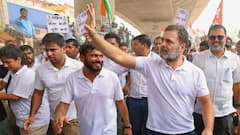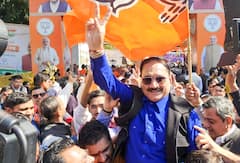'Chanakya Of Maharashtra Politics' Falters: What’s Next For Sharad Pawar And His NCP?
The Maharashtra Assembly elections have significantly weakened Sharad Pawar, the state's longtime political kingmaker. Pawar's NCP won only 13 seats, while his nephew Ajit Pawar's faction won 35.

The results of the Maharashtra Assembly elections have significantly altered the state’s political landscape, leaving several prominent leaders grappling with questions about their future. For the Congress, the elections delivered a major blow. Uddhav Thackeray's Shiv Sena, too, finds itself at a crossroads. However, the most profound challenge appears to be for Sharad Pawar, often referred to as the "Chanakya of Maharashtra politics".
Under Pawar’s leadership, the Maha Vikas Aghadi (MVA) coalition was formed, and his decision to install Uddhav Thackeray as chief minister bore fruit during the Lok Sabha elections, where the coalition performed well. Yet, the tides have now turned against Pawar, with his Nationalist Congress Party (NCP) faction emerging as the weakest link in the alliance during the state elections.
Sharad Pawar's Decline In Power
Over the years, Sharad Pawar has seen his influence wane. In these elections, his NCP managed to win only 13 seats, marking the worst performance in his political career. This is a significant decline compared to the success of Ajit Pawar’s faction, which, as part of the ruling "Mahayuti" coalition, has won around 35 seats. The Supreme Court's prior recognition of Ajit Pawar's faction as the "real" NCP further diminished Sharad Pawar’s grip on the party and his standing in Maharashtra politics.
In a symbolic defeat, even Pawar's family stronghold of Baramati has seen a shift. Ajit Pawar, running on the Mahayuti ticket, won against his own family member, Yogendra Shrinivas Pawar, by a significant margin. Baramati, long considered a bastion of Sharad Pawar’s political power, now seems poised to slip out of his hands.
Western Maharashtra, traditionally a stronghold of the Congress-NCP alliance with 70 Assembly seats, has seen a dramatic reversal. The Mahayuti alliance has gained a lead in 41 out of 58 constituencies in this region, leaving the MVA ahead in only 11 seats. These numbers underline the erosion of Pawar's influence, especially in his once-secure base.
Internal Struggles Within NCP(SP) And A Legacy In Question
The internal split in the NCP has been a significant factor in Sharad Pawar’s weakened position. Ajit Pawar’s alignment with the BJP and Eknath Shinde’s Shiv Sena has divided the party and its voter base. The Supreme Court's recognition of Ajit’s faction has not only legitimised the split but also dealt a blow to the core of Sharad Pawar’s political legacy. This division has further disillusioned the NCP's core supporters and compounded the party’s electoral losses.
For Sharad Pawar, these elections were more than just another political contest; they were a referendum on his decades-long political legacy. Over five decades, Pawar has been instrumental in shaping Maharashtra's politics, influencing governments from Delhi to Mumbai. However, at this stage of his career, the NCP’s dismal performance poses a serious challenge to his political stature and legacy.
Pawar has hinted at retirement in recent statements, acknowledging his age and expressing a desire to step back from active politics. “I have contested 14 elections from Baramati. I have served as Chief Minister four times and moved to the Lok Sabha. I chose not to contest the general elections last time and became a Rajya Sabha MP. My term ends in a year and a half, and I am considering stepping away from parliamentary politics,” he remarked recently.
Whether this loss signifies the end of an era or the beginning of a reimagined NCP under new leadership remains to be seen.
BJP's Strategic Triumph
The Bharatiya Janata Party (BJP) has emerged as the clear winner in these elections, with leads in over 130 seats at the time of writing. Their success is attributed to meticulous planning, grassroots mobilisation, and effective coalition management. The BJP maintained its traditional voter base while attracting new supporters by blending Hindutva ideology with caste-based strategies.
In the critical Vidarbha region, where the BJP previously struggled in the Lok Sabha elections, a specialised team of 100 workers led by Kailash Vijayvargiya worked to strengthen the party's position. The region, which includes 62 Assembly seats, saw the BJP gain significant ground, reflecting their improved outreach and electoral strategy.
While BJP’s dominance underscores its growing strength in the state, Sharad Pawar faces an uphill battle to reclaim his stature. The dual challenge of managing a fragmented party and a divided family.
For Maharashtra’s "Chanakya," this defeat could either mark the twilight of a remarkable political career or the foundation of a resurgence led by a younger generation within the NCP. The coming years will determine whether Sharad Pawar’s legacy can withstand these challenges or whether it will fade into political history.
This report first appeared in Hindi on ABP Live.

































